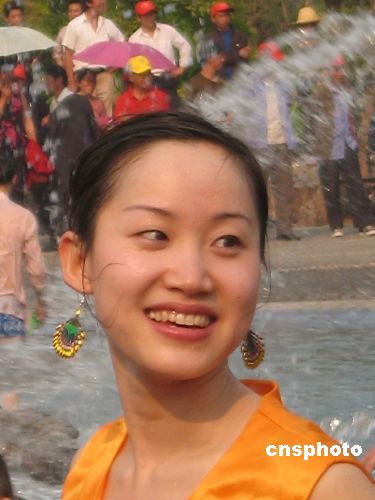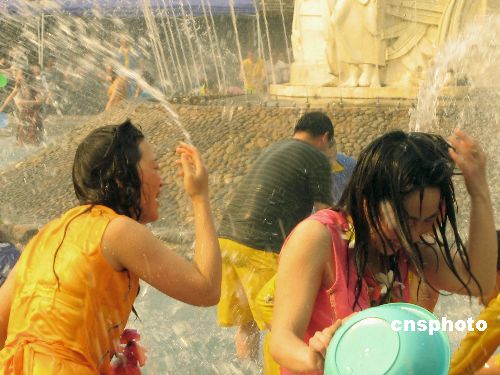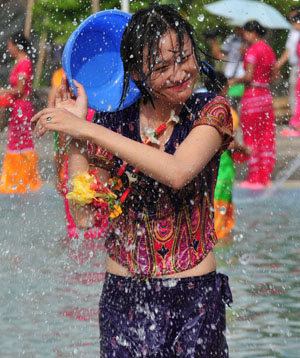Liao Jacob
Banned
Water-Splashing Festival -- held on New Year's Day, 1367, according to the Dai calendar -- was celebrated by both visitors and residents in Jinghong,
Xishuangbanna Dai Autonomous Prefecture in southwest China's Yunnan Province from April 12 to 18.

The annual Water-Splashing Festival is most important holiday of the Dai people. Held during the sixth month of the Dai calendar, usually falling in the middle of April, it is also known as the Festival for Bathing the Buddha.
Although there are numerous legends about the origin of the festival, one of the best known tells of the long-ago days when there was a devil in the village where the Dai people lived, doing all manner of evil. All the people hated him but his magic was too powerful for them to overcome.
One day in the sixth month, his seventh wife, who had been kidnapped from the village, tricked him into revealing his weaknesses. As he slept, his wives used his hair to cut off his head. But the head began to burn when it touched the ground, and the fire would die only if one of the women held the head tightly in her arms.
So the seven wives took turns holding the head, each for a period of one year. Every year when they changed, people would splash water on the woman who had been holding the head for the past year to wash away the blood and a year of fatigue.

As time went by, the ritual became a happy -- even raucous -- way to send off the old year and greet the new.
The days of the Water-Splashing Festival are filled with various activities: song and dance, dragon-boat races, the launching of rockets and the flying of Kongming lanterns, parades and fairs.
But water splashing is central to all because water is the symbol of holiness, goodness and purity. People gather along the roadsides and in public parks and squares armed with buckets and basins of water or
carrying squirt guns to drench each other in wishes for good luck and a happy new year.

The Dai people account for 34 percent of the population of Xishuangbanna and form the biggest ethnic group in Yunnan Province

Xishuangbanna Dai Autonomous Prefecture in southwest China's Yunnan Province from April 12 to 18.

The annual Water-Splashing Festival is most important holiday of the Dai people. Held during the sixth month of the Dai calendar, usually falling in the middle of April, it is also known as the Festival for Bathing the Buddha.
Although there are numerous legends about the origin of the festival, one of the best known tells of the long-ago days when there was a devil in the village where the Dai people lived, doing all manner of evil. All the people hated him but his magic was too powerful for them to overcome.
One day in the sixth month, his seventh wife, who had been kidnapped from the village, tricked him into revealing his weaknesses. As he slept, his wives used his hair to cut off his head. But the head began to burn when it touched the ground, and the fire would die only if one of the women held the head tightly in her arms.
So the seven wives took turns holding the head, each for a period of one year. Every year when they changed, people would splash water on the woman who had been holding the head for the past year to wash away the blood and a year of fatigue.

As time went by, the ritual became a happy -- even raucous -- way to send off the old year and greet the new.
The days of the Water-Splashing Festival are filled with various activities: song and dance, dragon-boat races, the launching of rockets and the flying of Kongming lanterns, parades and fairs.
But water splashing is central to all because water is the symbol of holiness, goodness and purity. People gather along the roadsides and in public parks and squares armed with buckets and basins of water or
carrying squirt guns to drench each other in wishes for good luck and a happy new year.

The Dai people account for 34 percent of the population of Xishuangbanna and form the biggest ethnic group in Yunnan Province















